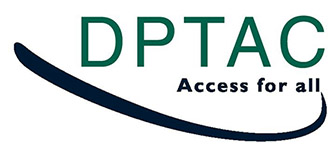DPTAC Main Committee meeting minutes March 2021
Updated 18 March 2025
11am to 3pm, 10 March 2021.
Attendees
DPTAC: Keith Richards (Chair), Will Bee, Chris Price, Tanvi Vyas, Roger Mackett, Dave Partington, Matthew Smith, Sue Sharp, Mike Brace, Sharon Brennan, Niki Glazier, Bryan Matthews, David Mapp, Helen Dolphin, Jessica Uguccioni.
Observers: No10, Cabinet Office, Mobility and Access Committee for Scotland (MACS).
Welcome and introductions
The Chair welcomed everyone to the meeting. Apologies noted were: David Chrimes.
The Chair asked for disclosure of any conflicts of interest. No conflicts identified.
National Strategy for Disabled People
The Head of the Cabinet Office’s Disability Unit (CODU) updated on the National Strategy for Disabled People (NSfDP), explaining the engagement methods used by the Disability Unit to inform the actions in the NSfDP.
DPTAC highlighted the importance of collating data and statistics and engaging with statistic teams across the department. The Committee also noted that the language used in the survey was not applicable for all disabled people. CODU explained that the online survey has limitations, and that not all demographics are represented in the data. However, the survey is one element of the engagement for the NSfDP, and the wider engagement methods will enable the collation of data from a broad pool of demographics.
Action: The Disability Unit to share demographic insights from the National Strategy for Disabled People’s public survey with DPTAC.
Action: DPTAC to send the Disability Unit a list of the language and formatting issues, and the potential implications of these, which it has identified with the online public survey.
DPTAC explained that the NSfDP has been developed in parallel with the Williams Rail Review, presenting an opportunity to ensure the outcomes and actions from both papers work in tandem. They also mentioned that standards are an important tool that ensure accessibility services are applied consistently and recommended that the NSfDP ensures government departments and wider industry maintain and develop robust standards.
Action: DPTAC and the Disability Unit to arrange a separate detailed meeting on the National Strategy for Disabled People
Local transport accessibility statistics
DfT explained that disability statistics are wide ranging, and so it’s important that his team collaborates with analysts across (i) the different modes of transport, and (ii) other government departments.
The Chair explained that it’s important that data drives policy making, and that intelligent analytical methods are used to produce robust data. DfT mentioned the use of The National Travel Survey (NTS) and other forms of data gathering that are utilised, such as the use of qualitative surveys to gain a more in-depth understanding of disabled people’s experiences.
DPTAC explained that there are disabled people who do not travel and are not represented in DfT’s statistics. DfT noted the importance of collating data on disabled non-travellers to understand the barriers preventing them from travel.
Action: DPTAC Research and Evidence Group and DfT Statistics Travel and Safety Team to arrange a separate meeting to discuss DPTAC’s detailed advice on DfT’s statistical publications.
DPTAC raised further points including whether the stats team has a method for recording confidence and the lack of time-series data to understand whether the transport network has become more accessible over time. DfT noted that the disability publication uses a variety of sources, each having their own definition for ‘disability’. DfT have decided to keep the time-series relatively short to maintain a level of consistency.
Action: DfT to provide a written response on the feasibility and methods for identifying confidence through statistics.
DPTAC offered to provide advice on draft surveys to ensure they’re accessible and the language is applicable. They also noted that almost half of local authorities’ Blue Badge enforcement data is recorded as ‘not applicable’. DfT clarified that LAs who do not have a policy to prosecute Blue Badge misuse are recorded as not applicable, DPTAC recommended that this data be presented as a ‘zero’ to provide a more accurate representation of enforcement.
Action: DfT to record Blue Badge enforcement statistics with numerical data for those LAs which have no enforcement policy in place.
DfT mentioned plans to digitalise the NTS. The survey is usually a face-to-face interview, wording of the questions is tested by DfT’s contractor who carries out the work on behalf of DfT, the contractor also carries out cognitive testing when questions are amended.
Buses and coaches
DfT explained the purpose of the National Bus Strategy (NBS), which was due to be published shortly.
DPTAC members raised points including:
- on the NBS specifically:
- the parallels between the Bus Strategy and the Inclusive Transport Strategy (ITS)
- the importance of coach accessibility
- the provision of accessible information
- pushing service providers beyond the meeting of minimum expectations
- the importance of engagement with a wide range of stakeholders
- the benefits of creating a stakeholder group to inform the design of the planned Review of the Public Service Vehicles Accessibility Regulations 2000 (PSVAR)
- the importance of disability awareness training for bus and coach drivers
- the need for appropriate resource and funding to progress enhancements in accessible vehicle design
Action: DfT to update DPTAC on plans for stakeholder involvement in the design of the PSVAR review.
Action: DPTAC and DfT to arrange a separate meeting following the publication of the Bus Strategy to discuss its actions and delivery plan in more detail.
Post items discussion
DPTAC noted a few points including:
- the need for DfT resource to deliver the actions in the Bus Strategy and emphasis on the quality of bus driver training
- discussing the Bus Strategy at the next Main Meeting in June
- the monitoring and evaluation process for the NSfDP
Next meeting
The next DPTAC Main Meeting will be on 15 June 2021.

